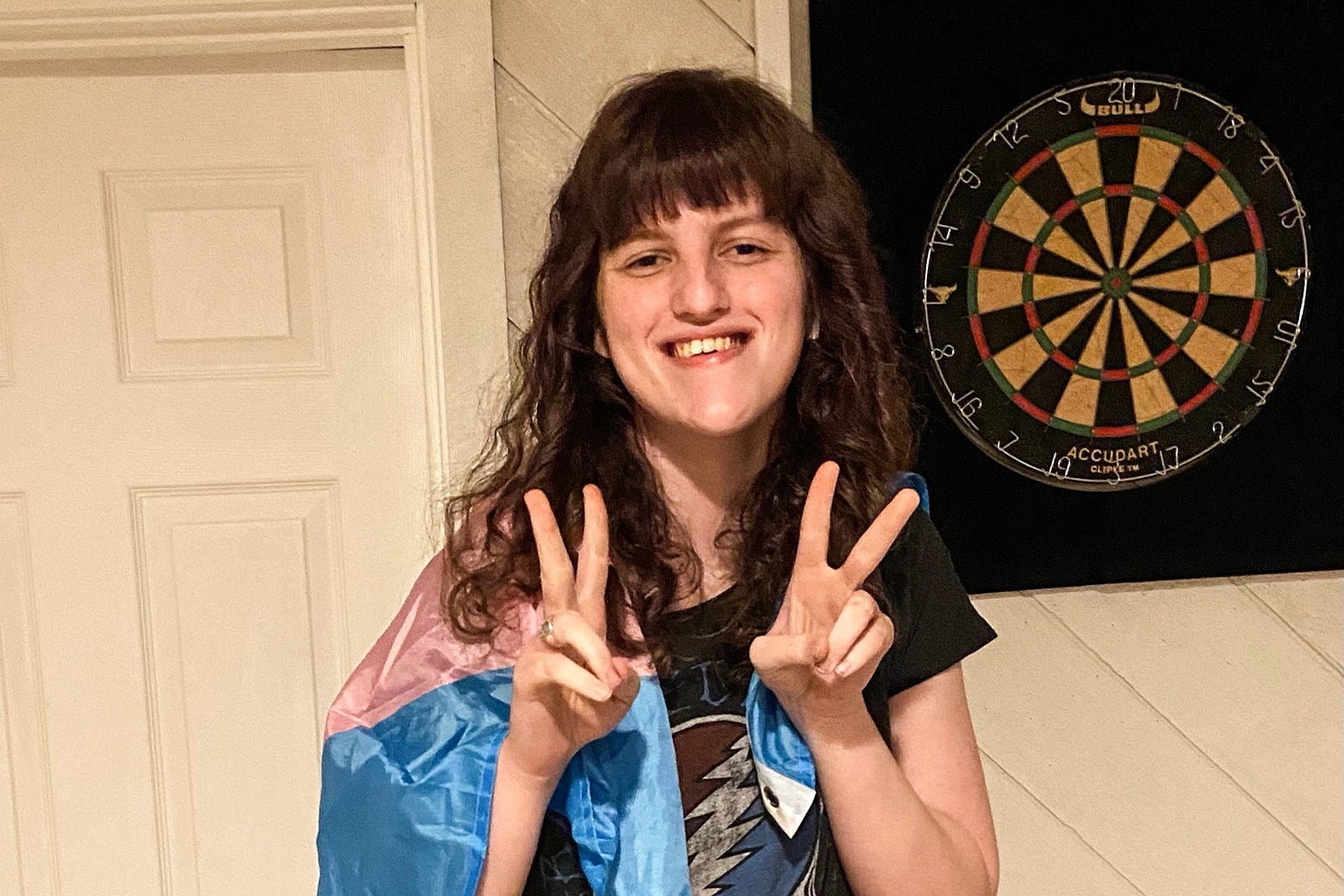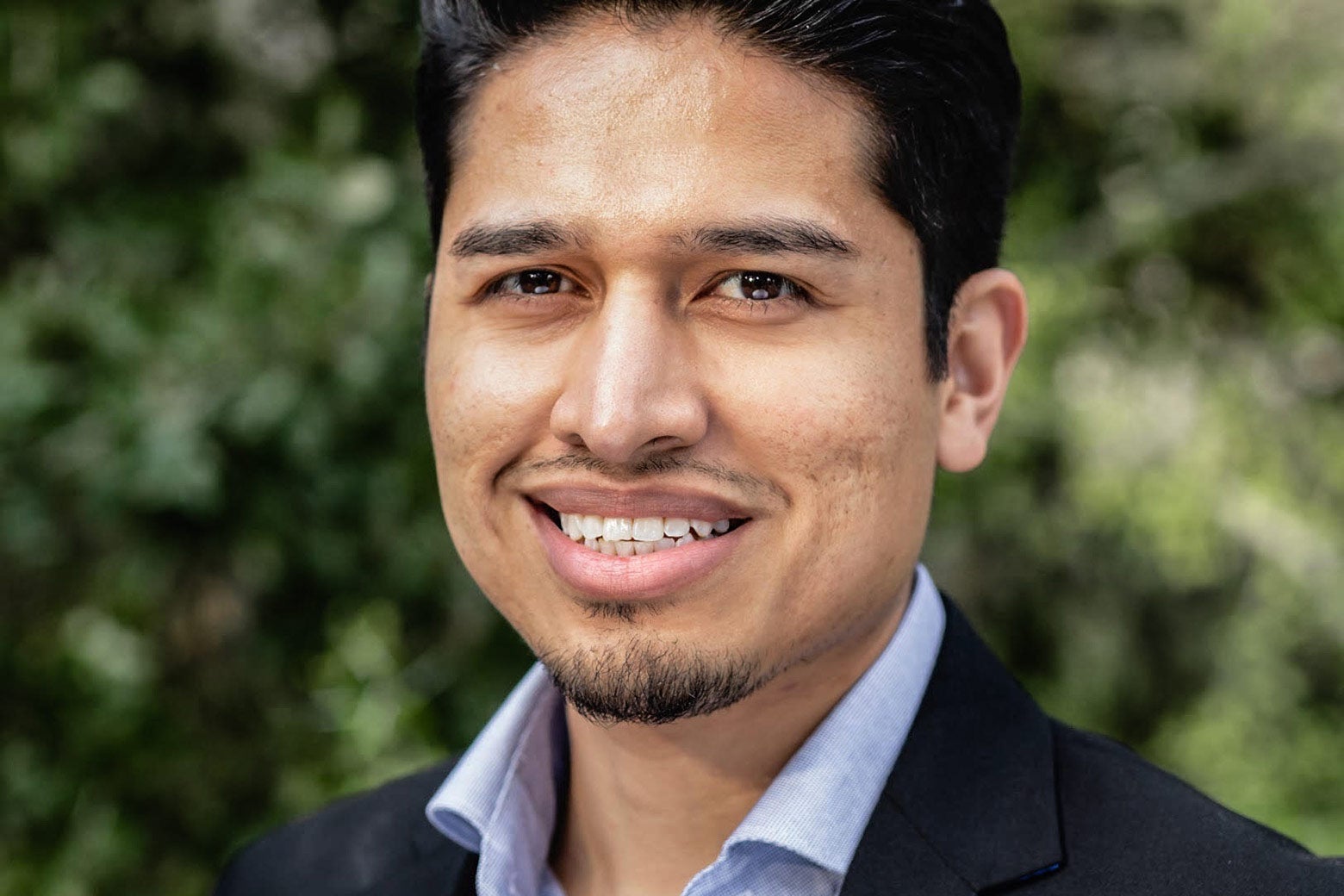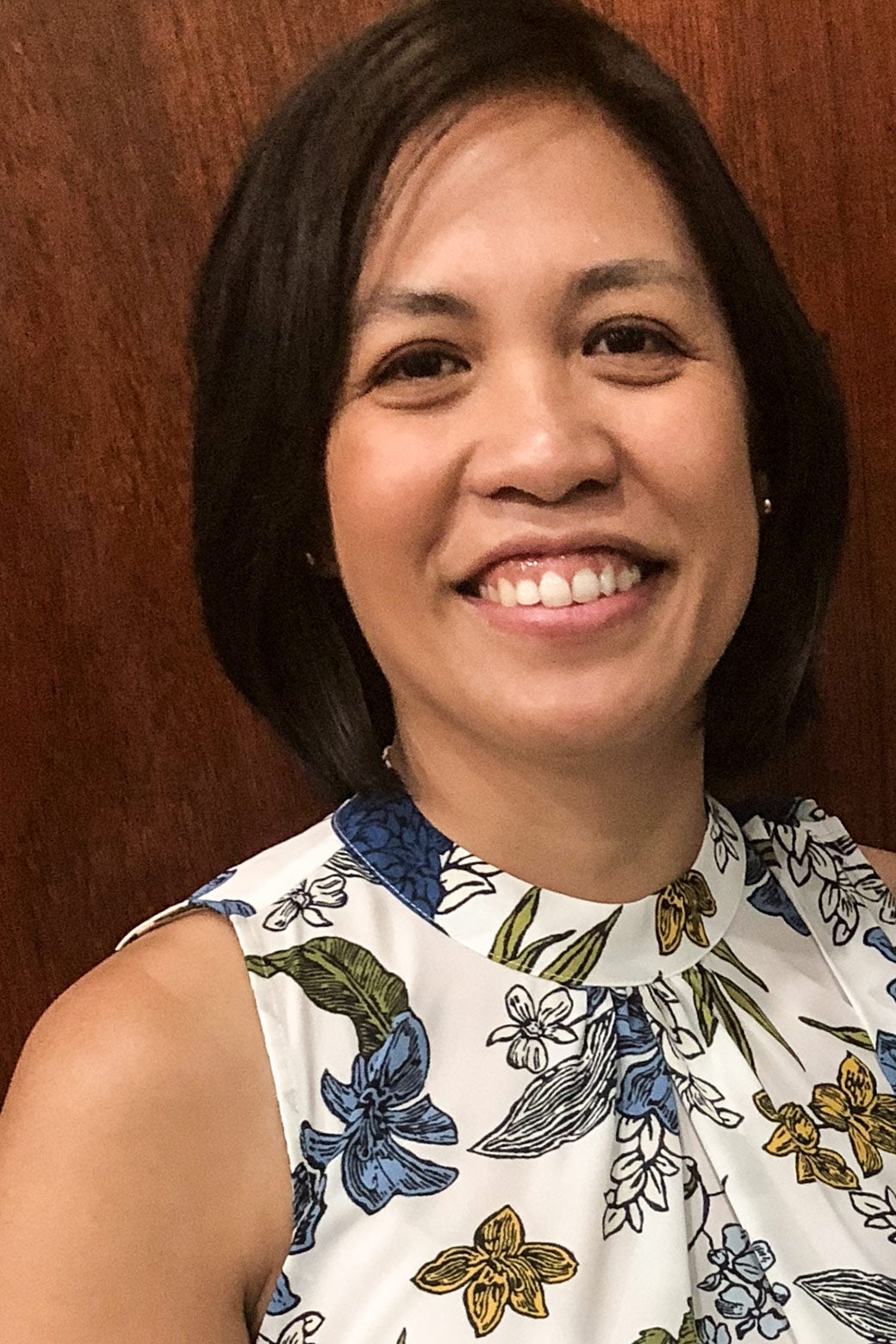Donald Trump will leave office on Jan. 20, but the president’s policies—consistently anti-immigrant, anti-science, and intolerant—have left behind thousands of damaged lives: people who found themselves separated from their children or parents, those who have come to fear for their own safety over their gender identity or race or sexual orientation, those who have lived in constant fear of deportation, and those who lost loved ones to an unnecessarily horrific pandemic.
Slate spoke to four Americans personally affected by the administration’s policies about how Trump has affected their lives and how they feel about a future without him as president. These interviews have been edited and condensed for clarity.

Mahdis in California
Mahdis is an American citizen who has been waiting three years to reunite with her husband, who has been kept out of the United States because of Trump’s travel ban. Mahdis was born in Iowa and grew up in California. She fell in love with her husband, Arash, when she was 15 and living in Iran. Ten years later, they married. She moved back to the U.S. in 2017 to start Arash’s process of applying for a green card. His application has been stalled since. Mahdis now lives in Irvine, California, teaches English as a second language, and is pursuing a master’s degree. Arash still lives in Iran, owns a travel agency, and hopes to study interior design once he arrives in the U.S.
It was October 2016 that we decided, OK, it’s time. I knew that I wanted to live in America because I grew up here, and I love this culture. I moved here in the beginning of 2017. And then that was the time that Trump pushed the travel ban. Arash had his interview in January 2018. And they said, ‘We don’t know when we’re going to give you a visa. It’s under administrative process.’ For a year and a half, that was reasonable, because of the travel ban. But last July, they started giving visas again, but I don’t know, it’s like the travel ban is still there. They say that men are more dangerous coming from these countries [because of mandatory military service]. My husband is not a threat. He’s going to be adding something to society; he wants to go to university here. He’s not going to be a burden for the government.
I am an energetic person. When I was working in Tehran, I got an award for being the most energetic person and having the most positive energy in my company. But right now I’m very down. I’m always weeping. I’m just 32 years old. And I am living through stress every day. Four years of my life, where we have to make critical decisions—have a baby, buy a home, save up for our future—were ruined by the policies of the person who is governing the country. I’m an ESL teacher; typically, my job is to teach about America, because they’re all immigrants. And I am supposed to tell them that you can have the American dream. If you work hard, everything is beautiful, everything is achievable. I hear these comments from the students: “What kind of a country is America that you cannot have your husband with you?” And I don’t know what to say.
My [comprehensive] exam was on Nov. 6. My master’s degree depends on this test. My friend [had just] received this email rejecting [her husband’s visa] case. So I had this nightmare, and I was waiting for the letter to come. I was crying in the middle of my comps. I missed a page on the test and didn’t answer like 20 questions. I knew the answers, but my mind was blocked. And then the next morning I woke up to Joe Biden winning. I felt relief. I felt amazing. I’m just like, OK, I don’t even care about the comps anymore. It was miracle news.
We had this great feeling of victory for one day, because the next day, we heard the Trump administration has been trying to put sanctions on Iran. So I’m hoping and praying for the best. Right now, I’m 90 percent hopeful, and there’s that 10 percent dark side. But before it was 10 percent hope and 90 percent dark. Even my husband in the past two days has been smiling. He has said, “OK, I think I should get ready. Maybe there’s a chance and we’re going to live as a family together.” Before Biden, we could not make any decisions. Between Nov. 3 and the seventh, I was like, “If Trump comes back, he’s going to take revenge, and he’s going to make it very hard on us.” This was my plan if Donald Trump became the president again: I would go live with my husband somewhere, maybe in Turkey. I was not going to stay here. But I have hope now. And I know that even if, God forbid, Arash received a rejection letter, I know that there is a chance we can fight it. Even if this thing happens, we can do something about it.
Everyone was calling me and they were congratulating me and saying, “We’re so happy that finally you’re going to be together.” But I didn’t do anything special to celebrate. I always have in the back of my mind my husband and our German shepherd. So I’m just like, I can’t have fun. I can’t celebrate like normal people do. It just doesn’t feel good. And like, OK, I’m just going to wait for them to come join me, and then we’re all going to celebrate together.

Esmée Silverman in Massachusetts
Silverman is a high school senior who lives in Easton, Massachusetts, and identifies as a transgender lesbian. She is 18 years old, and she was a freshman when Trump rescinded protections for transgender students. She became politically active in 2016 because she was inspired by the Bernie Sanders presidential campaign.
I was upstairs with my family watching MSNBC, and I saw that they projected Joe Biden to be the next president-elect after winning Pennsylvania. Everybody in my family was clapping. I immediately started crying. I was just so happy to finally put to bed this nightmare.
I am very lucky to live in a state like Massachusetts, which has very good protections for LGBT individuals. But emotionally, it was really draining having to check the news every day to make sure trans people weren’t banned in the U.S. or something like that. When Amy Coney Barrett was sworn in, I got shivers down my spine, because this is someone who could directly impact the lives of my friends and me, someone who can take away gay marriage, who can take away protections against LGBTQ+ individuals at workplaces. This is stuff that could affect me personally, that could affect my friends personally.
When I was a freshman, I was going through this horrible depressive episode. I was living in constant fear that I was going to be judged because of my identity. And when I finally came out at the end of freshman year and saw [Trump’s directive rescinding protections for transgender students], I was like, Are you kidding me? If you got to know me, you’ll know I don’t want to hurt anyone. And the fact that some Republicans were saying this was because people are trying to go into bathrooms to stalk people—it hurts me. We just want to go to the bathroom. I remember feeling anxious and depressed about it. I’m lucky to be in a school that has a gender-neutral bathroom, but it scared me.
Joe Biden was my last choice [of the Democratic candidates]. We need to start holding them accountable. I feel relieved that we’re going to go back to a time where people were civil, and not people openly misgendering people on the streets. But I’m also worried. What if the Senate does something? What if the Supreme Court does something? What if Joe Biden doesn’t want to anger Middle America?
But Joe Biden is in the first 100 days of office apparently going to sign a bill that prohibits discrimination at the workplace based on gender identity and sexual orientation. That bill is going to change a lot of people’s lives. A president who is going to make sure that LGBTQ+ people are protected by law—it’s a good step forward.
Originally, during the Obama administration, gay people started getting the right to marry, trans people started to get protections. It was amazing—LGBT people were finally going to get the rights that they deserve. And then Donald Trump came along, and he brought us back to a dark place. To be out of that is an amazing feeling. But to be right back where we started is a little bit degrading. But true change does not start from the top down; it comes from the bottom on up.

Irving Calderon in Texas
Calderon is a 29-year-old Dreamer—a Deferred Action for Childhood Arrivals program recipient—who was born in Mexico and brought to the United States when he was 7 months old. After Trump was elected in 2016 and Calderon became worried about the future of DACA protections, he became involved in advocacy work. (He previously worked as a project manager at General Motors.) He is now a graduate student at the School of Public Affairs at the University of Texas at Austin.
I’ve been here basically my entire life. I didn’t really have any other options available for me. Pre-DACA, I wasn’t able to work. When I was an undergrad, I wasn’t sure if I would be able to get a job. It was my junior year when DACA was instated, so it wasn’t until my junior year that I knew that I had a chance to actually use my degree.
The election was nerve-wracking, because it’s not just the presidential that we were concerned about. There’s the Senate in play. And then there were other elections here in the state of Texas that were going to be crucial and could have implications for my case, which requires not only a new president, but the Senate too, in order for any kind of legislation to have a chance.
There was that moment where I was thinking, “Oh, man, this doesn’t look good.” I was really worried that even after all the things that we’ve been through as a nation, it was still not going to be enough. I would be scared of how much more reckless Trump would be, since he wouldn’t have to worry about getting reelected. That made me worried about what he would do with DACA. He would have more freedom to cancel it or whatever he wants without repercussions.
The first person that texted me [after the election was called] was one of my Dreamer friends. And she was just ecstatic. And I’m excited too. But I can’t help thinking practically, about how it’s still going to be difficult. But it’s just a big sigh of relief, not having to worry about someone constantly attacking us.
I’m still waiting to see what happens with the Senate races in Georgia [that determine control of the Senate]. That’s going to be super critical. If Democrats are able to get the two Senate seats, we might be in for an actual solution for Dreamers to get a path. If not, it might be a struggle for a President Biden to do anything for us. So it is worrisome.
But then I’m also a lot more hopeful now than I would be under a Trump administration, because that just almost wouldn’t even be an option. So I guess you could just say I’m optimistic. It helps just being able to actually have constructive policy conversation. And I’m really excited for that.

Liza Billings in New York
Billings is an emergency room nurse in New York City. She contracted COVID-19 at the end of March and was hospitalized. Shortly afterward, her brother, Leo, was also hospitalized. He died of the virus three weeks later. Billings is a member of COVID Survivors for Change, an advocacy group, and has spoken out against Trump’s “callous and dangerous” statements downplaying the seriousness of the virus.
Last presidential election, I was at work. And it was just a terrible feeling to be there. I was taking care of a sexual assault victim at the time, and you are with this patient in a room for three to four hours. So I felt stuck, and she turned on the TV and was watching the news. And it was just a sad situation on top of a sad situation. People were coming in for anxiety, and a lady who was pregnant came in with contractions because she was so stressed. It was terrible.
I’m a Democrat, and I was fairly disturbed by everything that has been going on in the country. But when COVID hit, and especially after my brother died, I became much more involved. And then when [Trump] got sick with COVID and he came out and took off his mask and puffed up his chest, it really shocked me, the bravado of it. Donald Trump laid the foundation for mistrust and disbelief about the ways to mitigate COVID.
Saturday, I actually wasn’t watching TV. I had been glued to the TV since Tuesday night. But I work weekends, so I was in bed falling asleep after a shift. And then all of a sudden, I heard clanging and screaming and dogs barking, and it sounded like the 7 p.m. claps that we used to get. Then I checked my phone, I had like a thousand text messages. It was such a relief; it was almost like I had lost weight. I think I cried on and off for a good hour and a half. I really couldn’t believe it. It felt like finally something good was going to happen. There’s going to be a change. I got sad thinking about it because there are so many people who might still be here if things had been handled differently.
This was so different from the shift that I did four years ago. On my way to work, I was blasting “Celebration” as I drove, windows down. I turned on the music, and I danced into work. Everybody was happy. And even the sick patients that would come in, you know, would say, “I’m just so glad. I’m just so glad—no more.” For the most part everybody was very jubilant and celebratory or drunk.
Today, I’ll be going to my sister-in-law’s house for our victory dinner. As a family, we all said that if Biden won, then it was really for our brother. So it felt like we did it. We’re not super religious people, but my brother’s ashes are in her house, so we’ll probably say a little something to him. I think if he was alive, he wouldn’t have cared too much about the election. But I know he would be proud of the work, proud that we were part of something. I wish my brother was around to see this.

